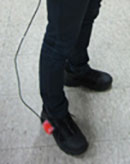- In conjunction with IPIN 2014 27-29 October 2014We are
pleased to announce the on-site Indoor Positioning and Navigation Competition, which is to be held during the IPIN 2014 Conference. The competition aims at bringing together academic and industrial research communities to work together on challenging open problems in indoor localization based on mobile devices and sensors, with the purpose of evaluating different approaches and envisioning new research opportunities. Recent years have witnessed increasing interest in location-based services and applications. In most cases, however, location information is limited by the accessibility to Global Navigation Satellite Systems (GNSS), which is largely unavailable in indoor environments.The competition will consist of the following two tracks.
Track 1: Smartphone based positioning
Track 2: Foot-mounted Pedestrian Dead Reckoning positioning
For Track 1 “Smartphone based positioning”, the competitors can use any sensor available on the smartphones used.For Track 2 “Foot-mounted positioning”, the candidates can use MEMS sensors (inertial, compass and pressure sensors); electronic devices such as tablet, notebook, etc. can be used for control and monitoring.
 |
 |
The competition will take place during the IPIN conference, in BEXCO, Busan, Korea. All competitors will be given the time to pre-test and setup their solutions for two days (27~28, October) prior to the test day (29, October).Evaluation criteria for the competition, restrictions on accepted technologies, technical rules to follow and a description of the benchmarks are detailed in the technical annex of this call, to be finalized by end of July. Possible refinements of the annex, also based on participating competitors’ comments, will be timely distributed to all participants. The annex will include information such as the site map, the distribution of wireless communication devices and more.A “competitor” can be any individual or group of individuals working as a single team, associated to a single or a number of organizations. Competitors apply for admission to the competition by providing a short (max 4 pages) technical description of their system, including details on algorithms and protocols. The Program Committee will accept or refuse the application in a short time, based on technical feasibility and logistic constraints, including a maximum number of competitors to be defined. In case of acceptance, competitors are required to provide a paper by the deadlines indicated below. The paper will be subjected to peer review in IEEE format: accepted papers will be presented during a session at the IPIN conference and will be published in PROCEEDINGS of IPIN 2014. An extended version of the best papers will also be published on the JOURNAL (ETRI Journal or Journal of Communications and Networks).The winners of the competition will be announced at a special session of the conference on 29 October 2014. Prizes will be awarded to the highest placed teams. We encourage submissions from both academia and industry (there are no restrictions on the composition of competing teams) with the aim of seeking innovative solutions based on mobile devices and sensors for indoor applications. Please check the web site for more information and regular updates on the progress of the competition.
- Contacts : Dongsoo Han (dshan@kaist.ac.kr) / Francesco Potortì (Potorti@isti.cnr.it)
:: Organizing Committee ::
General co-chairs
- Main contact point: Francesco Potortì (CNR-ISTI - IT)
- Local contact point: Dongsoo Han (KAIST - KR)
- Jongtaek Oh (Hansung University - KR)
- Yang Koo Lee (ETRI - KR)
|
TPC chair
- Filippo Palumbo (CNR-ISTI, Italy)
|
TPC members
- Koomin Jung (Kookmin University - KR)
- Jaejun Yoo (ETRI - KR)
- Giwan Yoon (KAIST - KR)
- Chansu Yu (Cleveland State University - US)
- Chi-Yin Chow (City University of Hong Kong, China)
- Inyeol Oh (KAIST, Korea)
- Alex P.Moschevikin (RTL-Service & PetrSU - RU)
- Maurizio Bocca (Politecnico di Milano - IT)
- Inyeol Oh (KAIST, Korea)
- Chi-Yin Chow (City University of Hong Kong, China)
- Joaquín Torres Sospedra (Universitat Castellón, ES)
- Andreas Braun (Fraunhofer, DE)
|

